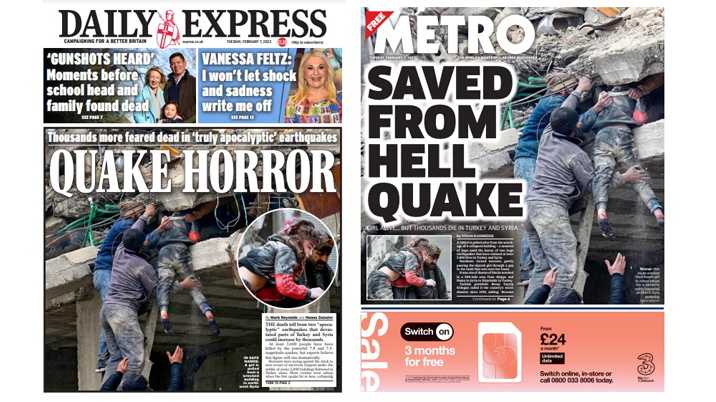
The quake – front page news (for some)
Is it a story of death and destruction or one of survival against the odds? Is it the numbers (almost entirely conjecture and without doubt wrong) that are compelling or the individual accounts? Or is it none of the above? Do we not care at all?
It was clear from the word go that the earthquakes in Turkey and Syria were devastating. It is 24 years since the last one close to this magnitude shook Turkey, killing 17,000. Communications have improved immeasurably since then – the BBC correspondent was filing using her mobile phone. Information and pictures are getting out more quickly. No news organisation could be in any doubt as to the scale of the story.
So, it came as quite a jolt to look through the front pages on Tuesday. First up was the Express, with a dramatic front with the headline “Quake horror” overwritten on a rescue photograph. The puffs remained under the titlepiece, but they were sober (the dead head teacher and columnist Vanessa Feltz’s marriage split). It felt right.
The Mirror had “Moment of hope amid the horror”, Metro “Saved from the quake”, the Sun “Help them”, the Mail “Defenceless”. The catastrophe dominated the top halves of the Guardian and FT and the centre of the Times front. They all kept the furniture, other stories, puffs. No one thought it a “clear everything” moment. Ah well, foreign stories. Turks and Syrians. You wouldn’t want to drop Beyoncé for them would you?
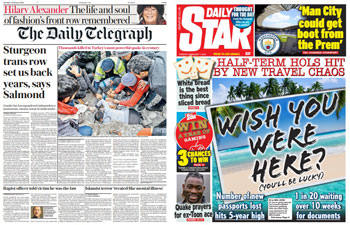
Next up was the Star and my heart sank. “Wish you were here?” asked the splash, which was about passport application delays: “If you’re going abroad for a much-needed half-term getaway, then you best hope your passport’s all sorted or you’re in BIG trouble.” Well, yes. It’s a valid story. But I doubt anyone who is still waiting for their new blue treasure three days before they plan to use it needs the Star to tell them that. Top of the front was Manchester City at risk of being kicked out of the Premier League (they won’t be) and there were some other bits and bobs until you reached the bottom lefthand corner to read “Quake prayers for ex-Toon ace”. Right.
The Star is a fun redtop. Sometimes it hits exactly the right note. Sometimes it doesn’t. Move on.
The next one to stop me in my tracks was the i. “Truss comeback has damaged Tories, pollsters warn”. The paper had talked to go-to polling guru Sir John Curtice and to Savanta and they didn’t think that Ms Truss’s reappearance at the weekend was a great idea. Just as Star readers are clever enough to realise that if their passport hasn’t arrived by now, the chances of their getting on that plane are remote, so i readers will probably have worked out for themselves that Truss was being disruptive. Indeed, they didn’t even need to work it out for themselves. Because the previous day’s splash had told them that she’d “sparked Tory turmoil”. Meanwhile “Thousands killed as they sleep” was given marginally more puff space than City.
If I thought that was a bit weird, I wasn’t prepared for the Telegraph with its jaw-dropping “Sturgeon trans row set us back years, says Salmond”. I had to double check I wasn’t looking at the Scottish edition. On what planet is this a more important or even interesting story than “Thousands killed in Turkey’s most powerful quake in a century”? Planet Schadenfreude, I guess. The one where we can enjoy SNP leaders sniping about each other – and on transgender issues at that. Indeed, the one the i also seemed to be inhabiting, since it’s hard to see why else it would care more about Tory upheaval than suffering Turks and Syrians.
And then, finally, I looked more closely at the Mail. There was a picture of the quake and I had assumed that the “Defenceless” headline was about the people killed in their beds. But no. It was about a couple of generals and some Tory MPs calling for increased defence spending. The sort of thing they might say any day of the week and the sort of thing that might be reported any day of the week. Possibly on page 4.
What have we become that we are so uninterested in the plight of people in other countries who are suffering? Do these papers reflect their readers lack of concern or assume it? It can’t just come down to “there’s nothing we can do about it” because that would also be the case if you were looking at the disappearance of Nicola Bulley, who has occupied the front pages for the best part of a fortnight.
And there is something we can do. The Sun’s “Help them” splash was about asking readers to send donations to an appeal fund that would be forwarded to the Red Cross. I always have doubts about these virtue-signalling enterprises. It shouldn’t be about the Sun, it should be about the people who need help; why not just publish details of any DEC appeal without seeking glory for yourself? But time and again, I’ve been proved wrong on this: readers do respond to papers’ front-page appeals in a way they don’t to the full-page ads on the inside. Whether the Sun is as eager to help should the quakes lead to a further exodus from Syria, we shall see.
By yesterday, the caravan had moved on, with only the Times maintaining the quake as the splash (an excellent front, by the way, far better than Tuesday’s). The rapist policeman, the dead head teacher, BP’s squillions of profit, a shortage of laughs and the revival of an ancient sitcom, and God going gender neutral (I know, you couldn’t make it up – not the story, but the fact that it is a national newspaper lead) all apparently had a stronger claim on readers’ attention than misery in the Middle East, where the official death toll had passed 7,200. But what’s this in the i? “Race to find quake survivors”. Or a race to catch up? Still, better late than never.

Today, with the official toll over 15,000, it is almost entirely absent from the front pages – a good show at the top of the Express, small puffs for the Mirror and (self-promoting) Sun, a nib in the Times. We’re far more interested in Zelensky saying we’re brilliant. And Nicola Bulley is still there at the top of the Mail.
To be fair, last night I, too, was more interested in Zelensky and was frustrated by being made to wait so long for him by the BBC Ten o’clock news. His visit and the prospect of deeper involvement in the conflict were a big deal and it’s right that they got the attention they did this morning. Of course the whitetops couldn’t resist putting Boris Johnson centre stage, because his great thoughts are invariably more relevant than those of, say, the president of Ukraine or the actual prime minister. But there you go.
I digress. It is inevitable that front-page interest in the quake will wane, apart from the occasional miracle survivor story. It will also get pushed back and shrink inside. But there are important questions about the way the rescue is being handled and about the international repercussions of this latest blow to Syria. It would be nice if these were given a good airing in our newspapers and if coverage were not reduced to heroic Brits digging through the rubble or deep into their pockets. I’m not holding my breath.

Casualty counts – nobody knows (yet)

As to those casualty figures. On Tuesday, at least three papers reported “experts” predicting that the death toll could pass 10,000. Yesterday, the Times had “experts” saying that the toll could reach 20,000. No experts were named by any of them. It wasn’t a hard prediction to make; as I said, 17,000 died in a slightly less strong quake in the 90s and the toll this time is bound to be high because of the timing – the middle of the night when people were at home in bed and more vulnerable. The numbers floated at the time of a disaster like this are always meaningless. The official body count is always unrepresentative of where it’s going to end up, the big numbers offered as predictions in the first hours are nothing more than guesswork. The only way to get any notion is to look at the totals from previous catastrophes and then examine the differences and similarities.
With 9/11, there were no precedents, and the numbers swirling around at the time were (thankfully) way too high. With Grenfell, the initial reports were way too low as was obvious when you did simple sums based on how many people lived in the tower. The fact is, we won’t know for weeks and newspapers are impatient. As we see, they’re already losing interest, when we do get as close as we can to a “final” toll, the story will be lucky to make a nib in foreign.
An old biddy spouting off in a fortnightly Notebook isn’t going to change a tradition that goes back more than a century, those anonymous “experts” sitting in the author’s head or on the subs’ desk will still find their way into the text in an uninformed attempt to give a sense of scale. Everyone knows they’ll be wrong. But maybe it wouldn’t be so much to ask that such speculation isn’t presented as fact in the headline?
The return of Truss
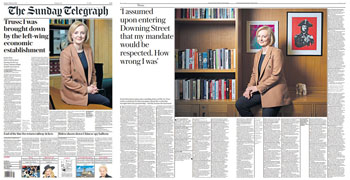
Ms Truss had a good poke at the wasps’ nest, didn’t she? Whatever happened to never complain, never explain? She managed both in her 4,000-word non mea culpa for the Sunday Telegraph. You’d never have guessed it, but I’m not a fan of newspapers handing over editorial space to politicians to press their case unchallenged. In this case, however, I don’t begrudge her the spread. For it tells us more than she could ever have imagined about her policies, her intellect and her character.
Nor was it surprising that she found a home for her comeback in the Sunday Telegraph, whose editor Allister Heath was a most enthusiastic promoter of the Truss-Kwarteng “fiscal event”. His front-page offering for the Saturday paper the day after the mini-budget was “Britain back at its boldest: this revolutionary budget adds up to the greatest I’ve ever seen”. The first sentence justified that head, asserting that it was the best budget delivered by a British Chancellor “by a massive margin”. It was so wonderful that he had to pinch himself to make sure he wasn’t dreaming.
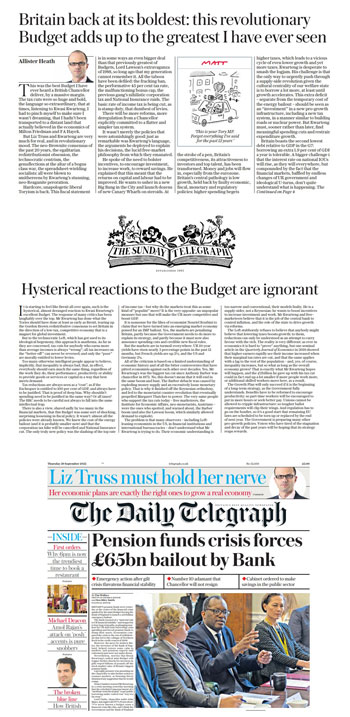
“The neo-Brownite consensus of the past 20 years, the egalitarian redistributionist obsession, the technocratic centrism, the genuflections at the altar of a bogus class war, the spreadsheet-wielding socialists: all were blown to smithereens by Kwarteng's stunning, neo-Reaganite peroration,” he wrote. It was greater even than Nigel Lawson’s 1988 extravaganza (hold that thought). Taboos had been defiled. It was astonishingly good. It was remarkable.
You could say that Heath was a fan. There was more in his own paper the next day, a 12-page mini-budget special and a leader declaring that the “hysterical” reactions were “ignorant”. As we know, the markets disagreed. But Heath was back at the top of the daily’s front the following Thursday, insisting that Truss must hold her nerve. Everyone else was wrong. She was not only right, she was exceptional in being right, he wrote for the oped. Come Sunday, Heath handed over more column inches to Ms Truss with an interview (the first since becoming PM) that made the splash (of course): “Truss: only my plan for growth will reverse UK’s slow decline”. The leader agreed, saying Tory MPs must give her their full support.
But they didn’t, and as the last drops of Truss’s authority trickled down the drain, Heath was still trying to stem the flow. Britain had a zombie economy and Truss and Kwarteng were being scapegoated.
Enough of the history. We can see that Heath was an advocate of Trussonomics and why he might feel it reasonable to give her room to expound her theories. But the splash is supposed to be a news report, not an opinion piece. She had those 4,000 words on 4 and 5 for that. The splash should have laid the ground for that essay, not replicated it. Obviously, it would pick out the best soundbites and present her view as the central element. But it should also have offered more context. Any context, in fact, beyond “the pound crashed and the Bank of England was forced to make an emergency intervention to calm market turmoil”.
Her article takes swipes left, right and centre, but none of her assertions is challenged. She says she wasn’t warned about the threat to pension funds, though one Twitter thread this week gave chapter and verse on how she had been. She accuses the OBR of putting fiscal policy in a straitjacket and says she disagreed with its assessment of the impact of her proposed tax cuts – but, as she admits, she didn’t ask its opinion before the event. And while she is complaining about being badly advised, the paper doesn’t mention that her first act on arrival in Downing Street was to dispense with the services of the Treasury’s most senior civil servant. Precisely because she thought him likely to tell her that her tax-cutting plans wouldn’t work. To her, Tom Scholar was not the most respected and experienced person available, he personified the “Treasury orthodoxy” she wanted rid of.
Only in the final sentence did Heath’s paper allow any questioning of the premise that she had been right and had been hard done by: a “senior government source” saying: “Ms Truss's approach ‘failed then, and will fail if tried again’.”
So much for rounded journalism. Still, the headline gave most people a good laugh. Who knew all those bankers and hedge fund managers and bond traders and pin-striped civil servants were the “leftwing establishment”?
The Mail’s reaction
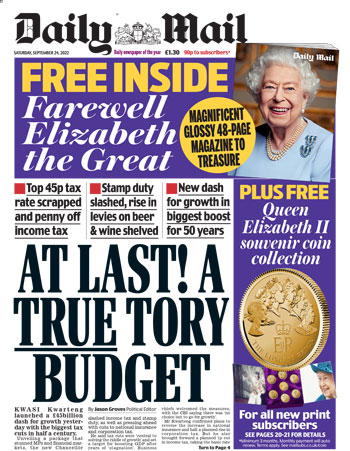
The Sunday Telegraph was hugely entertaining, but I was more interested in the sequel: what the Monday papers made of it – specifically, Monday’s Mail. It may have escaped your attention, but the Mail was a big promoter of La Truss back in the day. This Notebook examined the way the paper promoted her cause in the Tory leadership election and was as enthused as Allister Heath by the Kwarteng mini-budget – “At last! A true Tory budget” (If you missed it, the book is available from Amazon).
So what would it think to her comeback? When the end came, the paper distanced itself from her pretty spectacularly, accusing her of making “the party of Churchill a laughing stock”. But it was in presentational skills and self-awareness that it found her wanting; it is still beating the drum for her high-growth, low-tax agenda. Would the Mail endorse the essay and agree that she – and it – had been right all along? That is surely what it thought in its heart of hearts, but to come out and say so would stir the Tory stew. This was the moment we would learn whether the party or the economy (as in what the paper regards as best for the economy) came first. And the party won.
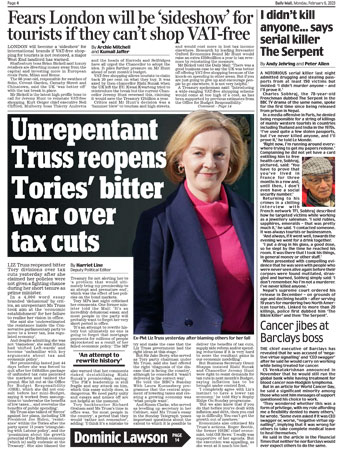
The page 4 lead was “Unrepentant Truss reopens Tories’ bitter war over tax cuts”. The story runs through her list of blameworthy people and organisations – but not before telling readers that critics have “branded her essay delusional”. It says that she was “forced to quit” after her “£45bn package of unfunded tax cuts panicked the markets and tanked the pound” – which is not quite the way the paper reported the response to the budget at the time – and it does couple her attack on the OBR with the fact that she didn’t consult it.
The rest of the story is a succession of Tory MPs criticising her, many of them saying they would prefer to forget her period in office (the one the Mail strove so hard to facilitate) and that she was undermining Rishi Sunak (the man the Mail tried to undermine because he had undermined Boris Johnson – are you keeping up at the back?)
Well, I’m not complaining about this coverage. It gave both sides of the story. Quite refreshing.
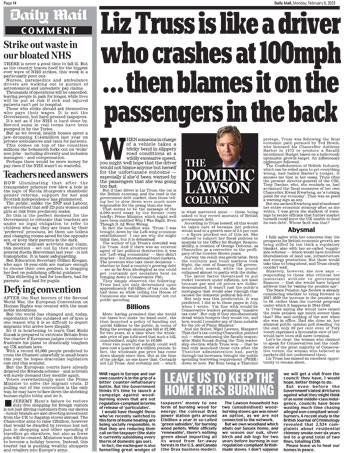
Turning to the Comment page, there was no leader. But there was a Dominic Lawson column, headlined “Liz Truss is like a driver who crashes at 100mph… then blames it on the passengers in the back”. You didn’t see that kind of heading in the Mail last autumn.
Lawson says that the author of Liz Truss’s downfall was Liz Truss. She had announced £45bn of tax cuts, insisted she would not cut public spending and followed up a denunciation of handouts by handing out “untold billions” by fixing energy prices for two years. The result, Lawson writes, was predictable. Indeed, he adds, he predicted it himself last July early in the Tory leadership campaign.
Sort of. In the column to which he refers – “Why my father, the great Tory tax-cutter, would be backing Rishi's cautious approach today” – he writes: “It is true that tax cuts can have a stimulating effect on the economy. Yet the problem facing us is not a lack of demand, but inflationary pressures. Adding to those might not be the brightest move on the economic chessboard.” Instant tax cuts would be fine, he concluded, so long as whoever was promising them also spelt out what budgets would be cut to finance them.
Of that “great” Lawson budget to which Allister Heath alluded on the day after Kwarteng’s effort, Lawson junior recalls that the tax cuts came only after inflation and public spending had been controlled, not while they were on the rise.
Looking back, it was quite the piece – and pretty much Lawson’s only offering (in the Mail) on the leadership, apart from an attack on Penny Mordaunt, which was almost obligatory at the time. It was a virtual endorsement of Sunak (who had made a study of Lawson senior’s memoirs) and this was counter to the thrust of everything the paper was running at the time. Sunak was too pessimistic, Truss had the right ideas. She was the one.
When the sky fell in, however, he was allowed to return and declare “Real Thatcherites would never have risked the Truss agenda of massive unfunded tax cuts”.
Lawson’s final sentence on Monday was a joy: “Liz Truss has missed an excellent opportunity to remain silent”. How interesting that she has also afforded Lawson the opportunity to speak again.
Charlie Wilson memorial – some surprising attendees
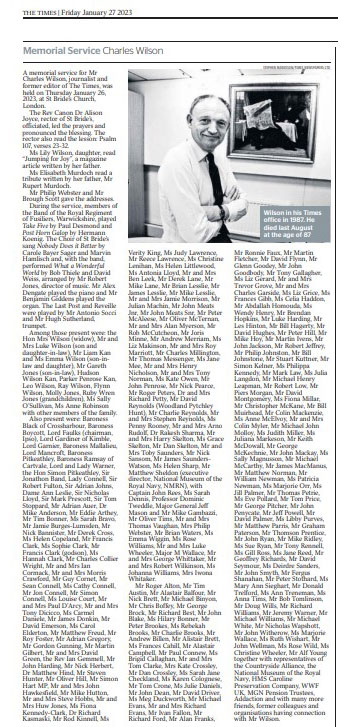
Two weeks ago, I was sitting in St Bride’s for Charlie Wilson’s memorial service. It was a special occasion, and I wrote about it for InPublishing here. The next morning I was pleased to see that it featured on the Times’s Court and Social page. Good to see some traditions prevail, even if not for everyone.
In the old days, of course, there would be someone outside the church collecting names. Until relatively recently actually. But not any more. There’s no need to spell out why. These days you are more likely to be asked to sign a condolence book and add your name to a sheet of paper to be sent to/collected by the press. But for Charlie’s send-off there was neither.
This resulted in some rogue names appearing in the Times’s report. A couple of old friends who were abroad, another couple who were ill with Covid. Not such a big deal. But also listed was Nick Herbert, the former Westminster Press chief, who had died two weeks earlier (Peter Sands wrote about that here). And long-serving Observer editor Donald Trelford, who was to die the next day in Mallorca after a long illness – and whose obituary would appear in the Times on the Saturday.
It is easy to see how this could happen: the family had been asked for – or offered – a list of guests and some were unable to make it on the day. No one would expect the family on such an occasion to go round with a tick list to check that everyone invited had turned up. Just as with anything else it publishes, it behoves the paper to make sure that the information it is sharing is accurate. Whether that is by ensuring that guests are asked to give their names by whatever means works most easily for all concerned – if they choose not to and thus miss having their names in print, so be it – or by sending someone in person to collar people on the steps, it doesn’t really matter. But it’s not good enough to take the attitude “well that’s what we were told” and shrug.
There is no point in playing at being the “paper of record” if the record is false.
Donald Trelford
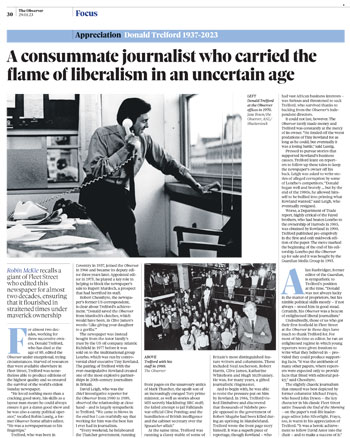
The era of warts-and-all obituaries is well-established, so there were few hagiographies around for Trelford. The Guardian was naturally complimentary, the Observer ran a nicely personal appreciation by Robin McKie, and no one could fail to note that he had been a courageous editor – given the history with Lonrho and Tiny Rowland. But there was also mischief afoot.
The Times likes to start its obits with an anecdote and it doesn’t mind if it’s one that might have embarrassed the subject. In this case, it was Trelford’s “dalliance” with Pamella Bordes, who had previously had a relationship with Andrew Neil, then editor of the Sunday Times. The story had made the front of the Sun and a Sunday Telegraph editorial that railed at “playboys” running national newspapers. According to the obit, Neil sued and was awarded £1,000; Trelford was too busy jetting off to Russia to interview Andrei Gromyko and was said to have been amused rather than upset. The story is illustrated with a Private Eye cover.
That said, the remainder of the 2,000-word essay leaves the reader in no doubt that Trelford was a force of nature.
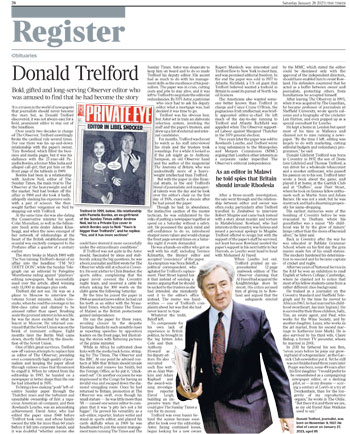
The Telegraph was more grudging – not least in waiting until the Monday to write about him at all, preferring Sylvia Syms that Saturday. Probably the right call for the readership. The thing that struck me about the Telegraph was not the words, however, but the choice of illustration. There were three pictures, one in the Observer office, one arguing for the life of Farzad Bazoft, an Iranian-born Observer journalist who was executed on the orders of Saddam Hussein, and one with Guardian editor Peter Preston. Here, the caption reads: “In 1993, with his Guardian counterpart Peter Preston on his way to answer charges of contempt of court relating to the Beverley Allitt murder case”. Neither Bazoft nor Allitt is mentioned in the obit.
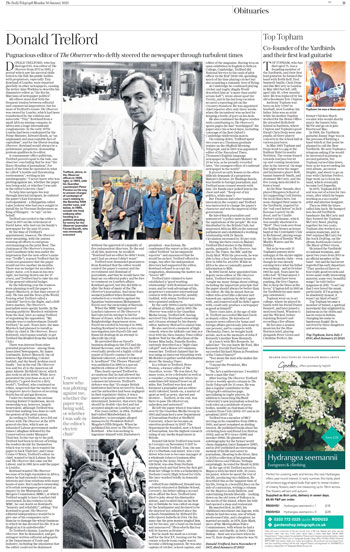
The Guardian and Observer were indeed rebuked by the judge in the Allitt case for publishing material while the jury was still considering its final verdicts (but after some had been delivered). They had been called to explain themselves and had apologised. The matter was referred to the Attorney General, but they were not charged with contempt.
Looking back to see what had happened in that case took me to the Alamy picture library. And guess what! Two of the three photographs in the Telegraph were among the first four that popped up on a search for “Donald Trelford”. And they had almost identical captions. It does feel a bit “grab the first thing that comes to hand”, which is a shame.
Again, the obit itself was quite generous and included a nice little anecdote about Jacqueline Kennedy that also appeared in a Mail diary column the next day.
As to the rest of Fleet Street, the Express surprised by running a small obit, and the Observer’s big Sunday rivals, the Telegraph and Times, disappointed by running not a word.
Let’s hope the Guardian gets the names right when it comes to the memorial service.
Front page of the fortnight

It’s not particularly pretty. But in terms of journalism, this is a no-brainer.
I seem to spend my life frustrated by “agenda” journalism, papers pushing their own commercial and political interests as “news”. And then along comes the Times with an investment in a story that made an immediate difference.
Paul Morgan-Bentley’s undercover work, exposing how debt collectors working for British Gas were breaking into people’s homes and forcibly installing prepayment meters that meant the poorest customers would have to pay more for their energy, was exemplary. Every box was ticked. There was first-hand evidence, corroborative quotes from those carrying out the work, the stories of the families affected, and industry and political reaction. Plus photographs.
For three days, the paper told the story, eliciting an apology from BG and action from the regulator. There was no sensationalism. It wasn’t necessary. These behaviours – the invasion of people’s homes, the turning off of heating during that very cold snap – spoke for themselves with no need for hyperbole.
A grand job all round.
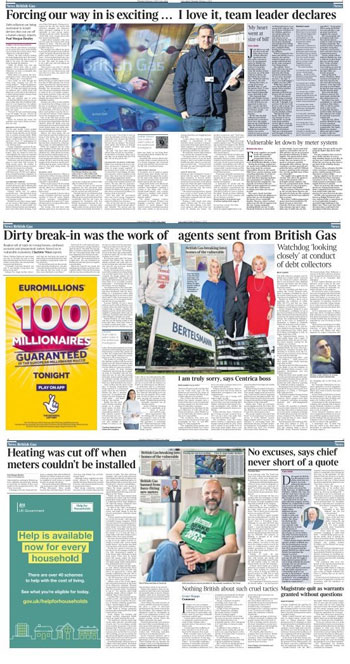
Liz Gerard’s Notebook is a fortnightly column published in the InPubWeekly newsletter. To be added to the mailing list, enter your email address here.












